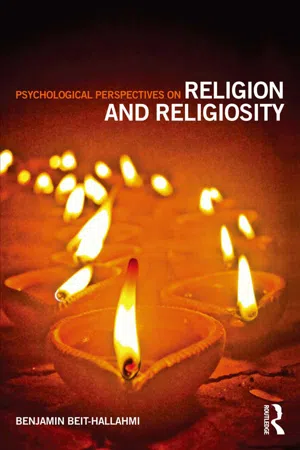
- 316 pages
- English
- ePUB (mobile friendly)
- Available on iOS & Android
Psychological Perspectives on Religion and Religiosity
About This Book
Is religion to blame for deadly conflicts? Should religious behaviour be credited more often for acts of charity and altruism? In what ways are religious and 'spiritual' ideas, practices and identities surviving and changing as religion loses its political power in those parts of the world which are experiencing increasing secularization?
Written by one of the world's leading authorities on the psychology of religion and social identity, Psychological Perspectives on Religion and Religiosity offers a comprehensive and multidisciplinary review of a century of research into the origins and consequences of religious belief systems and religious behaviour. The book employs a unique theoretical framework that combines the 'new' cognitive-evolutionary psychology of religion, examining the origins of religious ideas, with the 'old' psychology of religiosity, which looks at correlates and consequences. It examines a wide range of psychological variables and their relationship with religiosity. It is also provides fresh insights into classical topics in the psychology of religion, such as religious conversion, the relevance of Freud's ideas about religion and religiosity, the meaning of secularization, and the crucial role women play in religion. The book concludes with the author's reflections on the future for the psychology of religion as a field.
Psychological Perspectives on Religion and Religiosity will be invaluable for academic researchers in psychology, sociology, anthropology, political science, economics, and history worldwide. It will also be of great interest to advanced undergraduate students and graduate students across the social sciences.
Frequently asked questions
Information
Table of contents
- Cover
- Halftitle Page
- Title Page
- Copyright Page
- Contents
- List of tables
- Preface
- Acknowledgments
- 1 Defining psychology, defining religion
- 2 Exceptional or natural? The psychological roots of religion
- 3 Social learning and identity
- 4 Explaining variations in religiosity
- 5 Women and religion
- 6 Consequences and correlates of religiosity
- 7 Conversion and convert-dependent groups
- 8 Psychoanalysis and the psychological study of religion
- 9 Secularization and the persistence of religion
- Concluding remarks: The new psychology of religion
- References
- Index